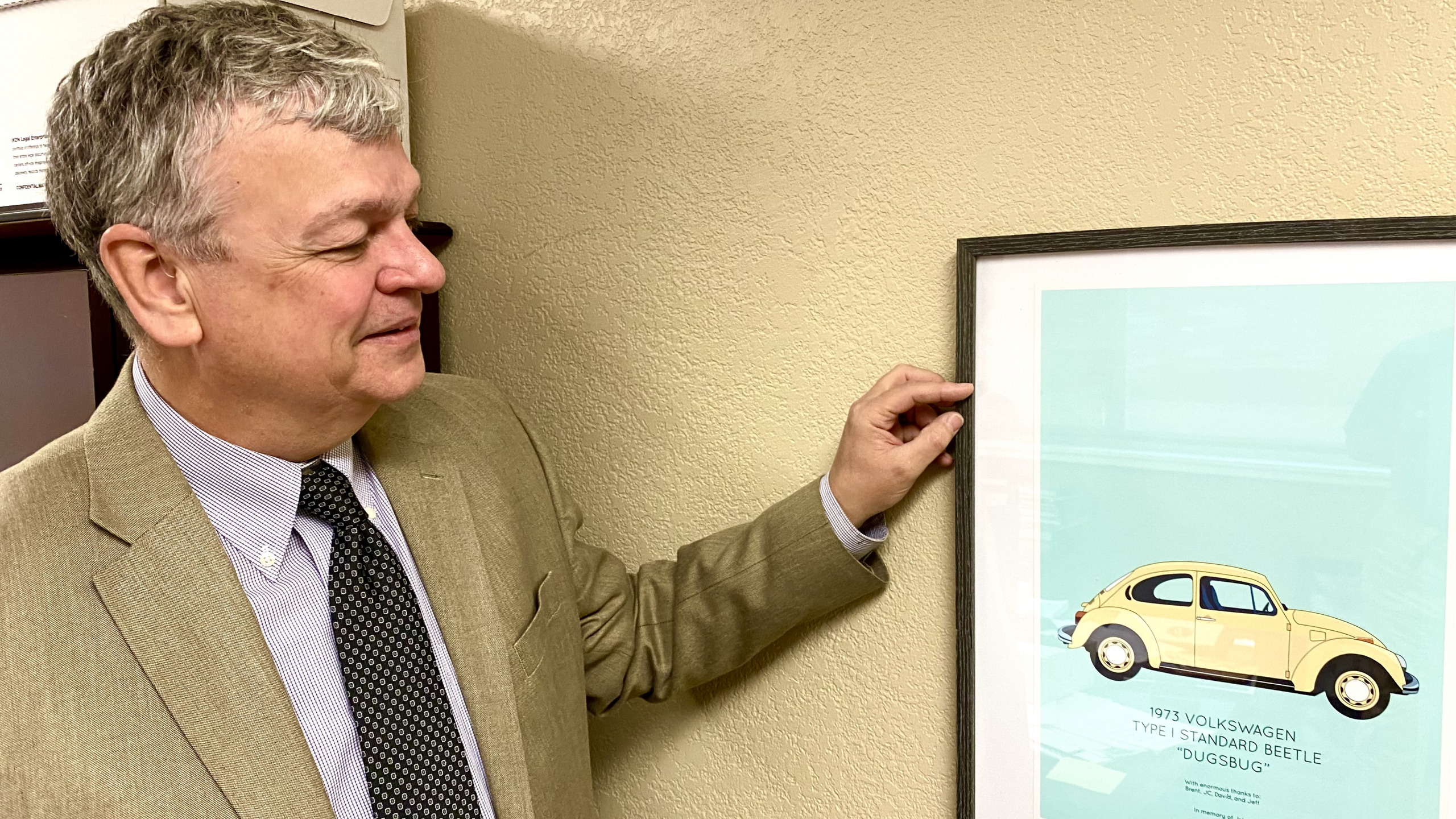Not altogether unknown in his ministerial role for the Rocky Mountain Conference, Douglas Inglish was invited to fill the position of vice president as of April 1, a vacancy left with the retirement of Eric Nelson.
A Hoosier, Inglish was born in Michigan City, Indiana and graduated from Andrews University in 1982 with a major in history and a minor in political science. After college, he served as boys’ dean at Ozark Adventist Academy for two years. He then left church employment to pursue other work opportunities but returned to teaching a few years later. After a year of teaching, he was given the opportunity to go into full-time ministry as a pastor where he spent the next 25 years serving rural, multi-church districts, multi-pastor metropolitan churches, and churches associated with Adventist institutions, including Sunnydale Academy and Minnetonka Academy. He has a Master’s Degree in political science from the University of Arkansas. Prior to joining the RMC team, Inglish served as the property manager and director of trust services, stewardship, and personal ministries for the Minnesota Conference. He has served as RMC director for planned giving and trust services since 2016.
In an interview with NewsNuggets, Inglish shared a few glimpses into his roles and personal experiences serving the Adventist church in several regions of North America.
Rajmund Dabrowski: How has your life-long ministry as a pastor, teacher, and conference departmental director, including trust and stewardship in RMC, prepared you for this executive leadership role?
Doug Inglish: It’s been good to have been involved with many of those different areas of church and education work, and it was important for me to understand the different positions that our own employees are involved in.
Of course, it’s not always possible to have done something on every church level, and I certainly haven’t, but getting a breadth of experience is important. My experience came from the fact that I’ve not spent my entire church career in one or two conferences. Working with committees at the conference and union levels gave me a familiarity with [administrative] processes, and with different ways of viewing those processes, as well as different philosophies of leadership and functions. This makes [it] possible for me to work with people who have different viewpoints. That background of working with different people gives me a level of comfort in working with pastors and churches.
RD: What are your strengths as a leader?
DI: There are evangelistic pastors, pastors-builders, and pastors who are peacemakers, but in my pastoral ministry, I was an administrative pastor. We don’t always choose what gifts God gives us, but I discovered that I enjoyed being an administrative pastor.
Sometimes, I would come into a church that had some processes that needed tweaking. For example, almost every church I ever came to, I would ask who’s on your worship committee? And their answer was, “Well, we don’t have one.” So, I would say, “I don’t like being the only one who decides how we worship. Let’s get process to make group decisions.” Or it might be a wedding policy, or streamlining officer selection. Whatever we could do to improve function and further the mission.
NN: How is this going to apply to the church diversity we have in the Conference?
Doug Inglish: I recognize there are different kinds of pastors and congregations out there and it’s important that we figure out their strengths, and the needs of a particular church. Whenever I came to a new church, it took me the better part of two years to really understand what that church’s strengths were, what the community’s needs were and how we line those up.
I’d like to think that I will be including the same approaches when it comes to pastoral placement. It is helpful to understand the church’s needs at that particular time. Are they primed and ready to do some serious evangelism? Are they struggling to get along with each other? Or do they need someone who can organize a capital expenditure, like putting up a new building, or an addition to the church.
NN: When reviewing your weaknesses, what needs a little bit of fine tuning?
Doug Inglish: You know the classic answer, I just give too much of myself. That’s always a hard one to be able to articulate, but I’m aware of it. You know, there are things that I need to address. And one of them, frankly, is a core need of this position. This is a record keeping position. This may sound funny from somebody who’s been working in trust [services] for as long as I have, but details are something that I prefer leaving to somebody else. I will need to work on this and like having someone to keep me on track, keep me focused.
To accomplish all this, and more, there is a need for prayer, and this isn’t the first job that has required that. You need that on two levels. I need time with God. But it’s also gratifying to know that other people are praying for me. I’ve had pastors who have reached out to me since I’ve come into this position for no other reason than to say: I’m praying for you in this new challenge.
NN: We live in a very picturesque area of the United States. In RMC we enjoy the nature in Colorado, Wyoming, and New Mexico. In your administrative role you will travel, travel, travel. Are you scared of such a prospect?
Doug Inglish: I love traveling. One of the reasons that my wife, Susan, doesn’t want to be employed full time is that she can travel with me. Of course, the Rocky Mountain Conference is the ideal place if you enjoy that kind of thing. We drive around and look at each other and say, “What took us so long to get here?” But more than just, you know, enjoying the ride, is when we get there.
When I go to a church I visit the area around it every opportunity I get. This is a beautiful part of the country. We’ve got park passes. As far as the diversity of the region, we are enjoying different cultures and food, as well as typography and climate, and everything else. It’s just an adventure to be able to discover all those wonderful places.
NN: One could say that your predecessor was a walking RMC encyclopedia…
Doug Inglish: That is intimidating because I am not. I have been in this conference in a narrower role, and for not very long. That’s going to take some getting used to for me and the conference. I don’t know everybody. And I don’t know all the situations like Eric did. And I think that was one of the great strengths of his work here for a very long time.
NN: … but being a newcomer to this has some advantages.
Doug Inglish: It gives you a fresh perspective. It gives you a fresh start. I followed some good pastors, but there were always people in those churches just waiting for change, just as some people were ready for a change when I would leave a position. But you have to keep it in perspective; change for the sake of change is seldom worth the effort, and even when changes are needed it’s usually tweaking, not a complete overhaul. I would say that no one should expect a revolution in this department. It isn’t broken, so big and obvious fixes aren’t necessary.
NN: Looking ahead, what are some of the goals you can identify at the beginning of your journey?
Doug Inglish: The answer a year from now will probably be different than what I say now. Because my goal right now for the next six months is to understand my position better so that I can serve better and to learn better the situations that need to be addressed. Currently, there are ongoing situations that I’ve had to jump into the middle of, and my colleagues, Ed Barnett, George Crumley, and Mickey Mallory have had to say, “Well, let’s give you some background.”
NN: Is there such a concept for Doug Inglish as having free time? How do you spend it? How do you recharge yourself?
Doug Inglish: I love working on the house, and you know, I’m a VW freak. Everybody knows that about me, it’s kind of a part of my identity. I spent a better part of 16 years rebuilding an old VW because it was such a basket case. And it took that long because you can only give so much time. While I no longer own it, it’s out there with a plate on it being driven right now. But what I discovered was that doing mechanical things can stress me more than relax me. Doing carpentry relaxes me. So we bought a house that needs some upgrading. And I’m having the time of my life.
And, uh, the bane of my existence currently is Pinterest because once it came out, my wife has some wonderful ideas for what I ought to be doing. My usual initial reaction is I don’t have that skillset, but with her encouragement I’ve done things I never would have tried otherwise. It’s something that we do together that we both really enjoy.
Susan is the idea person. She says, this is what I want to see happen. And I say, I think I know how to make that happen. That’s actually one of my strengths in office, I believe.
NN: Many of us want to know about your family?
Doug Inglish: I will begin with my wife, Susan. We met on a double date. My best friend was taking her out. We’re still friends now, by the way. It was one of those things where from the moment I took her out the first time, there was never any doubt. I was in over my head. It was just the easiest thing in the world to get to know her and make a decision [to marry her]. This is a lifelong partnership. We’re coming up on 39 years this year. We have a daughter, Chelsea, who is the youth pastor at the Madison campus church in Nashville, and a son, Joshua, who is a graphic designer, and his wife teaches third grade at Collegedale Academy.
As for my family background, I’m the son of a pastor and I have two brothers. We’re all close. Family is important to us. It means a great deal. Family, that’s where I give lot of my spare time.
NN: What is your message to the church?
Doug Inglish: We have a mission and when we are fulfilling it, there is joy.
–Rajmund Dabrowski, text and photos


